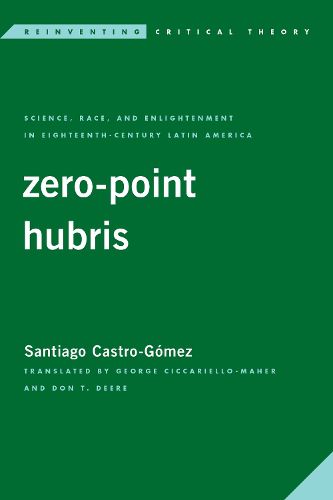Readings Newsletter
Become a Readings Member to make your shopping experience even easier.
Sign in or sign up for free!
You’re not far away from qualifying for FREE standard shipping within Australia
You’ve qualified for FREE standard shipping within Australia
The cart is loading…






Operating within the framework of postcolonial studies and decolonial theory, this important work starts from the assumption that the violence exercised by European colonialism was not only physical and economic, but also ‘epistemic’. Santiago Castro-Gomez argues that toward the end of the 18th century, this epistemic violence of the Spanish Empire assumed a specific form: zero-point hubris. The ‘many forms of knowing’ were integrated into a chronological hierarchy in which scientific-enlightened knowledge appears at the highest point on the cognitive scale, while all other epistemes are seen as constituting its past. Enlightened criollo thinkers did not hesitate to situate the blacks, Indians, and mestizos of New Granada in the lowest position on this cognitive scale. Castro-Gomez argues that in the colonial periphery of the Spanish Americas, Enlightenment constituted not only the position of epistemic distance separating science from all other knowledges, but also the position of ethnic distance separating the criollos from the ‘castes’. Epistemic violence-and not only physical violence-is thereby found at the very origin of Colombian nationality.
$9.00 standard shipping within Australia
FREE standard shipping within Australia for orders over $100.00
Express & International shipping calculated at checkout
Operating within the framework of postcolonial studies and decolonial theory, this important work starts from the assumption that the violence exercised by European colonialism was not only physical and economic, but also ‘epistemic’. Santiago Castro-Gomez argues that toward the end of the 18th century, this epistemic violence of the Spanish Empire assumed a specific form: zero-point hubris. The ‘many forms of knowing’ were integrated into a chronological hierarchy in which scientific-enlightened knowledge appears at the highest point on the cognitive scale, while all other epistemes are seen as constituting its past. Enlightened criollo thinkers did not hesitate to situate the blacks, Indians, and mestizos of New Granada in the lowest position on this cognitive scale. Castro-Gomez argues that in the colonial periphery of the Spanish Americas, Enlightenment constituted not only the position of epistemic distance separating science from all other knowledges, but also the position of ethnic distance separating the criollos from the ‘castes’. Epistemic violence-and not only physical violence-is thereby found at the very origin of Colombian nationality.